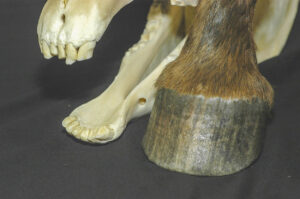Does Season Impact Old Horses’ Immune Function?
- Topics: Article, Immune System, Older Horse Care Concerns
Seasons impact horses in a variety of fairly obvious ways: Maybe your horse drops some weight in the winter due to the cold, blows up like a balloon on spring grass, gets a bit lazy in the summer heat, or becomes frisky as cooler fall temperatures arrive. But did you know that season can also impact horses in less apparent internal ways, such as their immune response? Researchers from the University of Kentucky Gluck Equine Research Center, in Lexington, recently sought to determine whether age can intensify those seasonal effects.
In a presentation April 30, Melissa Siard, a PhD candidate working under the direction of Amanda Adams, PhD, at the Gluck Center, presented findings from a study investigating season’s impact on senior horses’ immune function.
Researchers know that season impacts horses’ body weight, voluntary feed intake, and adrenocorticotropic hormone (ACTH, which plays a role in pituitary pars intermedia dysfunction , or equine Cushing’s disease) levels, among others.
They’ve discovered seasonal changes in other species, too. Siard said scientists have determined that baboons’ C-reactive protein (an inflammatory cytokine; cytokines are "messenger molecules" by which cells of the immune system signal and instruct one another) and interleukin-6 (another inflammatory cytokine) levels are lower in December compared to July
Create a free account with TheHorse.com to view this content.
TheHorse.com is home to thousands of free articles about horse health care. In order to access some of our exclusive free content, you must be signed into TheHorse.com.
Start your free account today!
Already have an account?
and continue reading.

Related Articles
Stay on top of the most recent Horse Health news with

















